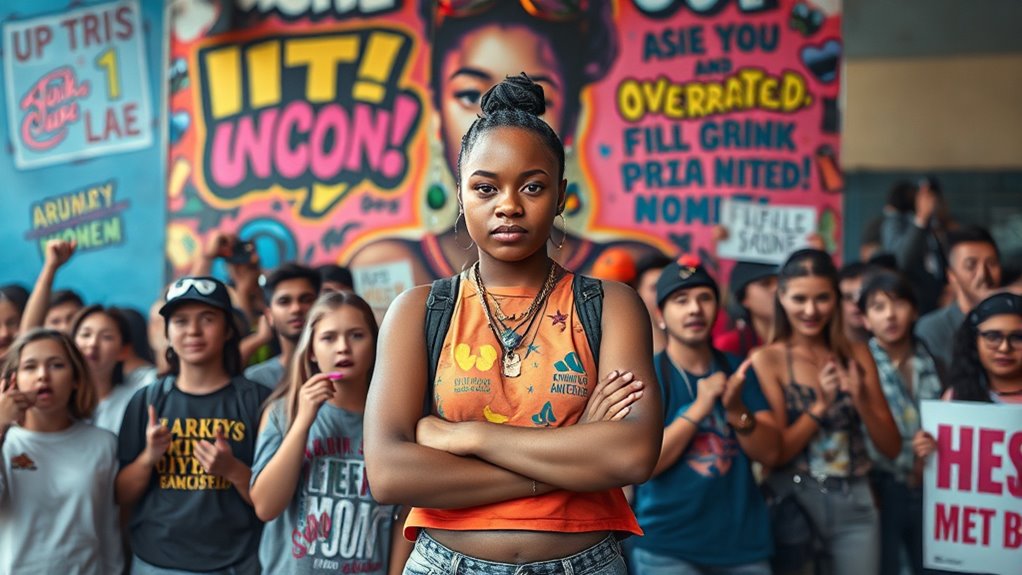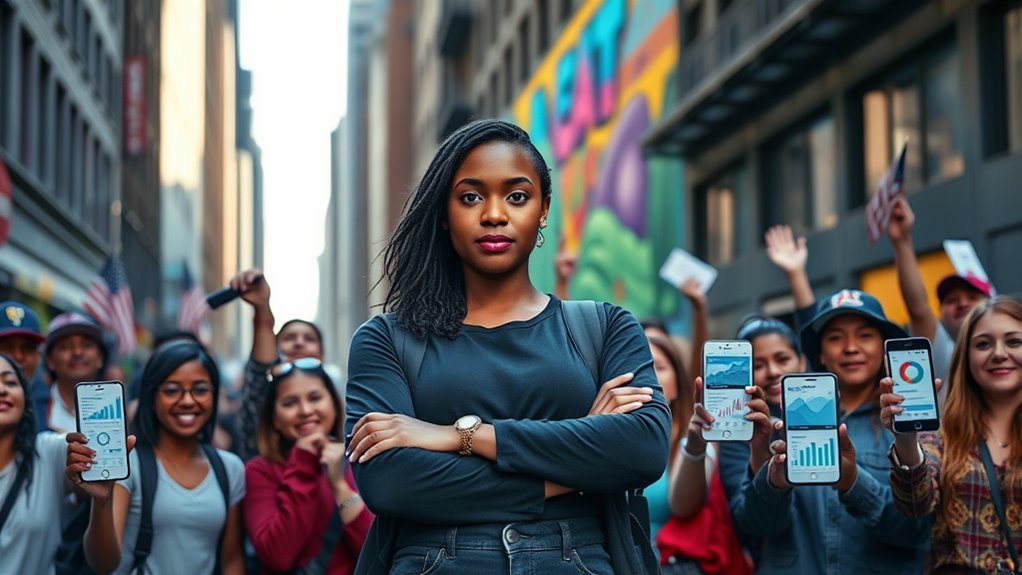When fans say you’re overrated, it’s vital to understand public perception and the media’s role in shaping opinions. Engage with critics calmly and listen to their concerns. Use social media platforms to connect and share your authentic self, highlighting your accomplishments. Philanthropic efforts and exciting collaborations can refresh interest in your work. By adapting strategies based on audience insights, you can shift narratives in your favor. Discover more ways to turn criticism into opportunity.
Key Takeaways
- Engage with critics calmly by actively listening to their concerns, demonstrating openness to dialogue about perceived overrated qualities.
- Use social media insights to understand fan sentiments and counter negative opinions with data-driven responses that highlight achievements.
- Foster community by showcasing unique aspects of her work that resonate with fans, emphasizing authenticity and connection.
- Collaborate with influencers or other artists to amplify positive narratives and create viral moments that shift public perception.
- Regularly share behind-the-scenes content and personal stories to enhance relatability, deepening fans’ emotional investment and loyalty.
Understanding Public Perception

Understanding public perception is crucial because it shapes the way individuals and communities respond to various issues. Your views are influenced by race, ethnicity, and education level, which affect how you interpret information. Where you live also plays a role; geographical location can shape your thoughts on environmental and social matters. Economic conditions, like inflation and employment rates, directly impact your opinions. Additionally, public opinion polls can provide a snapshot of how the general population feels about specific issues, further influencing individual perspectives. Personal experiences further mold your perceptions, making them unique. Additionally, cultural values and age differences contribute to divergent attitudes among people. The impact of social justice movements on public discourse can also significantly alter how issues are perceived and addressed across communities.
Analyzing the Role of Media

Public perception is heavily influenced by media, which shapes how we view public figures and societal issues. The media sets the agenda by choosing which stories to highlight, directly affecting what you think is important. It frames information in ways that can alter your interpretation and opinions. When you trust a media source, you’re more likely to accept its messages, while biased reporting can polarize views. Media also facilitates the spread of information, raising awareness and influencing your concerns. As you engage with these narratives, you might align your opinions with those highlighted by opinion leaders. Ultimately, the media’s power lies in its ability to shape perceptions, behaviors, and even public policy discussions. This is evident in the way media acts as a powerful force in modern society, influencing the public’s attitudes and beliefs. Furthermore, the rise of digital nomadism has become a focal point in discussions about work-life balance and lifestyle choices, demonstrating how media narratives can shift societal trends.
The Influence of Social Media

While you scroll through your feeds, it’s hard to ignore how social media shapes your opinions and behaviors. With over 5.24 billion users globally, these platforms influence consumer choices and shape public opinion. 63.9% of the global population uses social media, highlighting its pervasive reach and impact on daily life. The rise of cybersecurity measures has become increasingly pertinent as social media platforms face scrutiny over user privacy and data protection.
You probably notice that 81% of adults make online purchases weekly, often swayed by what they see on social media. You might find yourself using an average of 6.83 platforms each month, with YouTube and Facebook being among the most impactful.
As younger generations dominate these spaces, it’s clear that social media’s role isn’t just about connection; it’s about forming trends and community identities. With a 4.1% growth rate this year, its influence is only set to grow, making it essential to stay informed.
Strategies for Reinvention

To thrive in today’s fast-paced business landscape, organizations must embrace strategies for reinvention that foster flexibility and adaptability. You can pivot quickly by encouraging a culture of innovation and collaborating with external partners. Make customer needs your priority—listen to feedback and conduct surveys to guide your innovations. This customer-centric approach helps you develop products that resonate with evolving preferences. Utilizing data-driven decision-making technology, leveraging data analytics and automation to enhance efficiency and improve customer experience is essential for success. Furthermore, successful startups often break free from traditional business models by embracing dynamic resource reallocation and minimum viable product initiatives.
Engaging With Critics Effectively

Engaging with critics effectively can turn potential conflicts into opportunities for growth. Start by maintaining a calm demeanor; it encourages open dialogue.
Practice active listening to show you’re receptive to feedback, and acknowledge any valid points made. This builds respect and fosters collaboration. Additionally, establishing healthy boundaries can help you manage the conversation and prevent misunderstandings.
Use open-ended questions to dive deeper into their concerns, creating a bridge between differing perspectives through empathy.
Focus on shared goals and consider collaborative problem-solving to shift conversations from confrontation to cooperation. Embrace a solution-focused mindset when addressing criticism to devise specific strategies for improvement.
Always follow up on feedback to show commitment to improvement.
Lastly, being culturally aware can enhance your engagement, making interactions more meaningful and productive.
The Power of Philanthropy

Philanthropy wields incredible power, especially when backed by celebrity influence. When a celebrity endorses a cause, donations often skyrocket, giving vital credibility to nonprofits. Celebrity endorsements lead to increased financial support for various charitable organizations, which further amplifies their mission.
You mightn’t realize it, but social media amplifies these efforts, letting celebrities connect with millions instantly. This visibility can inspire you and others to contribute, creating an emotional bond with the cause.
The relationship between celebrities and charities is mutually beneficial; as they gain a positive image, the causes receive crucial support. Over time, this involvement can lead to sustained awareness and engagement, encouraging you to take action.
Ultimately, celebrity philanthropy not only raises funds but also builds communities around important issues, making a lasting impact in the world.
Collaborations to Refresh Interest

As brands seek to capture your attention in an ever-crowded marketplace, collaborations with celebrities have become a powerful strategy to refresh interest and create buzz.
Experiential marketing brings you immersive experiences that go beyond traditional ads, while unique brand partnerships connect you with fresh audiences. In 2025, a new wave of artist partnerships will emerge, focusing on creating community connections that enhance fan engagement. These partnerships will likely leverage advancements in AI integration in healthcare to improve fan interactions and tailor experiences.
Pop-up performances and surprise events generate massive social media chatter, often showcasing celebrities promoting brand products.
Unofficial collaborations, like stunts at concerts, create viral moments that enhance visibility.
These partnerships also engage local communities, transforming host cities into lively environments.
Leveraging Data-Driven Insights

Data-driven insights are revolutionizing how brands connect with audiences in the entertainment industry. By understanding audience preferences through data analytics, you can create tailored content that resonates with viewers. Additionally, the entertainment industry is valued at over 2.43 trillion USD, highlighting the immense potential for growth through data-informed strategies.
Predictive analytics allows you to forecast the success of films and TV shows, ensuring smarter investments. Moreover, utilizing predictive modeling can enhance your understanding of audience behavior, leading to more informed content creation. Personalized experiences enhance brand loyalty, while optimized marketing strategies identify effective channels and gauge audience sentiment. With data-driven decision-making, your content strategy can adapt to emerging trends, giving you a competitive edge. Targeted advertising based on consumer data maximizes impact, while sentiment analysis of social media feedback enables quick adjustments.
Ultimately, leveraging these insights not only boosts engagement but also opens new revenue avenues, making your entertainment offerings more appealing and relevant.
Frequently Asked Questions
What Are Some Common Reasons Celebrities Are Labeled as Overrated?
Celebrities often get labeled as overrated for several reasons.
You might notice that their talent doesn’t match their fame, or their reliance on looks overshadows genuine skills. Media overexposure can make you tired of hearing about them, while controversies can damage their reputation.
If they don’t contribute significantly to their field or society, it’s easy to see why some may perceive them as overrated. Public expectations play a huge role too.
How Can Fans Help Improve a Celebrity’s Public Perception?
So, you think you can save your favorite celebrity from the abyss of being “overrated”? Well, you can!
Start by flooding social media with your best fan art and positive reviews—because nothing says “I’m awesome” like a five-star rating!
Organize campaigns that showcase their charitable work, and don’t forget to engage with them during Q&As.
Every little bit helps to build a shining reputation, so rally the troops and let the world know!
Are There Any Positive Outcomes From Being Seen as Overrated?
Being seen as overrated can actually lead to some positive outcomes. You might feel pressured to innovate and prove your critics wrong, which can boost your creativity.
Increased scrutiny often drives you to improve and reassess your abilities, fostering resilience. The attention can also open new opportunities and collaborations, enhancing your visibility.
Plus, the discussions sparked by negative perceptions may contribute to your cultural relevance, turning scrutiny into a platform for growth.
How Do Personal Biases Affect Perceptions of Celebrities?
Imagine a painter, splashing colors based on emotions rather than reality. Your biases shape how you view celebrities, acting like a filter over their true essence.
You might see their charm as genuine or deceptive, depending on your experiences. These biases create a lens that skews your judgment—like believing a tall tale because it fits your narrative.
Recognizing these biases helps you see beyond the surface, allowing a clearer understanding of their complexities.
What Role Do Celebrity Endorsements Play in Public Perception?
Celebrity endorsements play a pivotal role in shaping public perception.
When a celebrity you admire backs a cause or candidate, it can influence your views and engagement. Their popularity often sways opinions, especially among younger audiences.
While you might feel inspired to participate politically, remember that not everyone shares the same enthusiasm.
Celebrity endorsements can drive awareness and registration, but they don’t always guarantee you’ll vote for their endorsed choices.
Conclusion
In a world where opinions can shift like sand, it’s crucial to embrace your uniqueness and rise above the noise. Remember, even the brightest stars face criticism. By engaging with your audience and reinventing your image, you can turn doubt into admiration. Use social media as your canvas, paint your narrative, and let philanthropy showcase your heart. Collaborate and innovate, and you’ll find that the tides can turn in your favor, leaving the label of “overrated” behind.









